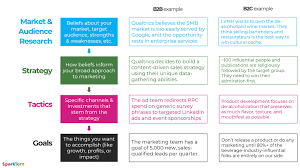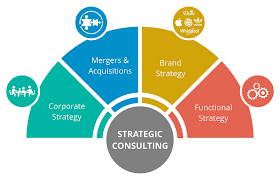Strategic Consulting: Unlocking the Path to Success
In today’s highly competitive business landscape, companies are constantly seeking ways to gain a competitive edge and achieve sustainable growth. This is where strategic consulting plays a pivotal role. Strategic consulting is a dynamic process that helps businesses navigate complexities, identify opportunities, and develop effective strategies to achieve their goals.
At its core, strategic consulting involves working closely with businesses to analyze their current state, understand their aspirations, and chart a path towards success. It goes beyond short-term fixes or quick solutions; instead, it focuses on long-term planning and execution.
One of the key benefits of strategic consulting is gaining an outsider’s perspective. Often, businesses can become too immersed in their day-to-day operations, making it challenging to see the bigger picture. Strategic consultants bring fresh insights and objective analysis to the table. They conduct thorough research, assess market trends, analyze competitors, and evaluate internal capabilities to identify areas of improvement and untapped potential.
Another crucial aspect of strategic consulting is aligning business objectives with actionable strategies. Consultants work closely with business leaders to define clear goals and objectives that are realistic yet ambitious. They then develop comprehensive strategies that encompass various facets such as market positioning, product development, operational efficiency, marketing initiatives, and more.
Strategic consultants also play a vital role in change management. Implementing new strategies often requires organizational restructuring or process improvements. Consultants help businesses navigate these changes by providing guidance on effective communication plans, training programs for employees, and ensuring smooth transitions.
Furthermore, strategic consulting provides a roadmap for growth by identifying new market opportunities or potential diversification avenues. By conducting thorough market research and trend analysis, consultants can assist businesses in identifying emerging markets or untapped customer segments that align with their core competencies.
Collaboration is at the heart of successful strategic consulting engagements. Consultants work closely with business leaders and stakeholders throughout the entire process – from strategy formulation to implementation. This collaborative approach ensures that strategies are not only well-crafted but also feasible and aligned with the organization’s culture and values.
Measuring success is also a crucial aspect of strategic consulting. Consultants help businesses establish key performance indicators (KPIs) to track progress and ensure that strategies are delivering the desired outcomes. Regular monitoring and evaluation enable businesses to make necessary adjustments, seize emerging opportunities, and stay ahead of the competition.
In conclusion, strategic consulting is an invaluable resource for businesses aiming to thrive in today’s dynamic marketplace. It provides a structured approach to analyzing, planning, and executing strategies that drive growth, enhance competitiveness, and maximize long-term success. By leveraging the expertise of strategic consultants, businesses can unlock their true potential and navigate challenges with confidence. Embracing strategic consulting can be the catalyst that propels businesses towards sustainable growth in an ever-evolving business landscape.
7 Frequently Asked Questions about Strategic Consulting in the UK
- What is the salary of strategic consulting?
- What are examples of strategy consulting?
- How do you describe strategic consulting?
- What is the difference between consulting and strategic consulting?
- What skills should a strategy consultant have?
- What does a strategic consultant do?
- What skills does a strategy consultant need?
What is the salary of strategic consulting?
The salary of strategic consultants can vary significantly depending on factors such as their level of experience, the consulting firm they work for, their geographic location, and the specific industry they specialize in. Generally, strategic consultants are well-compensated due to the high level of expertise and value they bring to organizations.
Entry-level consultants typically earn a competitive base salary, which can range from around £40,000 to £60,000 per year in the UK. As consultants gain more experience and progress in their careers, their salaries tend to increase accordingly. Mid-level consultants can earn anywhere between £70,000 and £120,000 per year.
Senior-level or principal consultants with extensive experience and a proven track record of delivering exceptional results can command even higher salaries. Their earnings may exceed £150,000 per year or more.
It is important to note that these figures are approximate and can vary based on individual circumstances and market conditions. Additionally, many consulting firms offer additional benefits such as performance-based bonuses, profit-sharing schemes, health insurance coverage, retirement plans, and other perks that contribute to the overall compensation package.
It’s worth mentioning that independent or freelance strategic consultants may have different compensation structures as they typically charge clients on an hourly or project basis. Their rates can vary significantly depending on their expertise, reputation, and demand for their services.
Ultimately, the salary of a strategic consultant reflects the value they bring to organizations through their strategic insights and problem-solving abilities.
What are examples of strategy consulting?
Strategy consulting encompasses a wide range of services and areas of focus. Here are a few examples of strategy consulting:
- Market Entry Strategy: Consultants help businesses evaluate and plan their entry into new markets. This involves conducting market research, assessing competition, analyzing consumer behavior, and developing strategies to gain a competitive advantage.
- Growth Strategy: Consultants assist businesses in identifying opportunities for growth and developing strategies to capture them. This may involve expanding into new product lines or markets, optimizing existing operations, or exploring mergers and acquisitions.
- Digital Transformation Strategy: With the rapid advancement of technology, consultants help businesses develop digital transformation strategies to stay competitive in the digital age. This includes leveraging digital tools, optimizing processes, enhancing customer experiences, and adopting emerging technologies.
- Corporate Strategy: Consultants work closely with business leaders to define the overall direction and goals of the organization. They help develop strategies that align with the company’s vision, mission, and values while maximizing shareholder value.
- Organizational Restructuring: Consultants assist businesses in reorganizing their structures and processes to improve efficiency and effectiveness. This may involve streamlining operations, redesigning workflows, or implementing new systems or technologies.
- Cost Optimization Strategy: Consultants help businesses identify cost-saving opportunities without compromising quality or performance. They analyze existing processes, identify inefficiencies, negotiate with suppliers, and recommend strategies for cost reduction.
- Innovation Strategy: Consultants assist businesses in fostering a culture of innovation by developing strategies to generate new ideas and bring them to market successfully. This may involve creating innovation frameworks, establishing R&D processes, or implementing open innovation initiatives.
- Sustainability Strategy: As environmental sustainability becomes increasingly important for businesses worldwide, consultants help organizations develop sustainable business practices and strategies that minimize environmental impact while maintaining profitability.
These are just a few examples of strategy consulting services available to businesses across various industries. The specific focus areas depend on the unique needs and objectives of each organization. Strategy consultants tailor their services to address the specific challenges and opportunities faced by their clients, ultimately helping businesses achieve their goals and stay ahead in a competitive marketplace.
How do you describe strategic consulting?
Strategic consulting is a specialized service that helps businesses develop and implement effective strategies to achieve their goals and gain a competitive edge. It involves working closely with clients to analyze their current state, identify opportunities, and chart a path towards success. Strategic consultants provide objective insights, conduct thorough research, and assess market trends to develop tailored strategies that align with the client’s objectives and capabilities. They assist in areas such as market positioning, product development, operational efficiency, marketing initiatives, and change management. Strategic consulting is a collaborative process that aims to drive growth, enhance competitiveness, and maximize long-term success for businesses in today’s complex and dynamic business environment.
What is the difference between consulting and strategic consulting?
Consulting and strategic consulting are related but distinct concepts in the business world. While both involve providing expert advice and guidance to businesses, there are key differences in their scope and focus.
Consulting, in general, refers to the practice of offering professional advice and expertise to individuals or organizations seeking assistance in solving specific problems or improving their performance. Consultants bring specialized knowledge and experience to address a wide range of challenges, such as operational inefficiencies, financial management, marketing strategies, human resources issues, and more. The primary goal of consulting is to provide solutions or recommendations that address immediate concerns or improve specific areas within an organization.
On the other hand, strategic consulting is a subset of consulting that specifically focuses on helping businesses develop and implement long-term strategies for success. Strategic consultants work closely with businesses to analyze their current state, understand their goals and aspirations, conduct market research, assess competitors, evaluate internal capabilities, and formulate comprehensive strategies that drive sustainable growth. Strategic consulting takes a holistic approach by considering various factors such as market dynamics, industry trends, competitive landscapes, organizational strengths and weaknesses, and customer needs. The primary objective of strategic consulting is to guide businesses in making informed decisions that have a lasting impact on their overall direction and success.
While traditional consultants may provide valuable insights into specific areas or projects within a business, strategic consultants take a broader view by considering the entire organization’s strategy and aligning it with market opportunities. They help businesses identify new growth avenues, optimize resource allocation, enhance competitive positioning, manage change effectively, and navigate complex business environments.
In essence, while both consulting and strategic consulting involve providing expert advice to businesses, strategic consulting has a more comprehensive focus on long-term planning and execution. It goes beyond addressing immediate concerns or isolated issues by guiding businesses towards sustained success through well-crafted strategies tailored to their unique circumstances.
What skills should a strategy consultant have?
Being a successful strategy consultant requires a combination of skills and qualities. Here are some key skills that are essential for strategy consultants:
- Analytical Thinking: Strategy consultants must possess strong analytical skills to assess complex business problems, analyze data, and identify patterns or trends. They should be able to break down complex issues into manageable components and apply logical thinking to develop effective solutions.
- Strategic Mindset: Strategy consultants need to have a strategic mindset, which involves the ability to think critically, anticipate future trends, and envision the bigger picture. They should be able to see connections between different elements and understand how each decision impacts the overall strategy.
- Problem-Solving Abilities: Strategy consultants are problem solvers at their core. They should be adept at identifying problems, generating creative solutions, and making sound recommendations based on thorough analysis. Strong problem-solving skills help consultants navigate challenges and devise innovative strategies.
- Business Acumen: A deep understanding of business principles, industry dynamics, and market trends is crucial for strategy consultants. They need to grasp the complexities of various industries and possess knowledge about different functional areas such as finance, marketing, operations, and human resources.
- Communication Skills: Effective communication is vital for strategy consultants as they often work with diverse stakeholders across all levels of an organization. They should be able to convey complex ideas in a clear and concise manner through both written reports and verbal presentations.
- Collaboration and Interpersonal Skills: Strategy consultants frequently work in teams or alongside client personnel. Therefore, strong collaboration skills are essential for building relationships, fostering teamwork, and managing conflicts effectively.
- Adaptability: The ability to adapt quickly in dynamic environments is crucial for strategy consultants who often encounter new industries or face rapidly changing market conditions. Consultants must be comfortable with ambiguity and demonstrate flexibility when adapting their strategies accordingly.
- Project Management Skills: Strategy consulting engagements involve managing multiple projects simultaneously while meeting deadlines and client expectations. Effective project management skills, including planning, organizing, and prioritizing tasks, are essential to ensure successful delivery.
- Ethical Conduct: Strategy consultants often have access to sensitive information and must maintain the highest ethical standards. They should prioritize confidentiality, integrity, and honesty in all aspects of their work.
- Continuous Learning: The field of strategy is constantly evolving, and consultants must stay updated with the latest industry trends, emerging technologies, and best practices. A commitment to continuous learning helps consultants provide valuable insights and innovative solutions to their clients.
While possessing these skills is important for strategy consultants, it’s worth noting that ongoing development and refinement of these skills through training and practical experience are crucial for long-term success in this demanding field.
What does a strategic consultant do?
A strategic consultant is a professional who assists businesses in developing and implementing effective strategies to achieve their goals. Their primary role is to provide expert advice and guidance to help organizations make informed decisions and navigate complex challenges.
Here are some key responsibilities of a strategic consultant:
- Analysis and Assessment: Strategic consultants conduct thorough analysis of a business’s current state, including its internal operations, market position, competition, and industry trends. They assess strengths, weaknesses, opportunities, and threats (SWOT analysis) to identify areas for improvement and growth potential.
- Strategy Development: Based on their analysis, strategic consultants work closely with business leaders to develop comprehensive strategies that align with the organization’s vision and goals. They help define clear objectives, outline action plans, and identify key milestones for implementation.
- Market Research: Strategic consultants conduct market research to gather insights about customer preferences, market trends, emerging opportunities, and competitive landscapes. This information helps businesses make informed decisions regarding product development, market positioning, pricing strategies, and target markets.
- Financial Analysis: Strategic consultants analyze financial data such as revenue streams, cost structures, profitability ratios, and investment opportunities. They help businesses understand their financial performance and identify areas for improvement or cost-saving measures.
- Change Management: Implementing new strategies often requires organizational change. Strategic consultants assist in managing this change by providing guidance on communication plans, training programs for employees to adapt to new processes or systems smoothly.
- Performance Measurement: Strategic consultants establish key performance indicators (KPIs) to track progress towards strategic goals. They develop measurement frameworks that allow businesses to evaluate the effectiveness of implemented strategies regularly.
- Stakeholder Management: Strategic consultants work closely with various stakeholders within an organization – from executives to frontline employees – ensuring alignment of objectives and fostering collaboration throughout the strategy implementation process.
- Continuous Improvement: A strategic consultant’s job doesn’t end with strategy formulation; they also support businesses in monitoring and evaluating the outcomes of implemented strategies. They identify areas for adjustment, seize emerging opportunities, and help businesses stay agile in a rapidly changing business environment.
Overall, a strategic consultant brings expertise, objectivity, and a structured approach to help businesses make informed decisions and execute effective strategies. By leveraging their knowledge and experience, strategic consultants empower organizations to navigate challenges, optimize performance, and achieve long-term success.
What skills does a strategy consultant need?
Being a successful strategy consultant requires a combination of skills and qualities that enable them to navigate complex business challenges and deliver effective solutions. Here are some essential skills that a strategy consultant should possess:
- Analytical Thinking: Strategy consultants must have strong analytical skills to gather, interpret, and analyze large amounts of data. They should be able to identify patterns, trends, and insights that drive strategic decision-making.
- Problem-Solving Abilities: Strategy consultants are often faced with complex problems that require innovative solutions. They need to have the ability to think critically, break down problems into manageable components, and develop creative strategies to address them.
- Strategic Mindset: A strategy consultant should have a deep understanding of strategic thinking and the ability to see the bigger picture. They must be able to connect different pieces of information and develop holistic strategies that align with the overall business objectives.
- Business Acumen: It is essential for strategy consultants to have a solid understanding of business fundamentals, including finance, marketing, operations, and industry dynamics. This knowledge allows them to assess the impact of different strategies on various aspects of the business.
- Communication Skills: Effective communication is crucial for strategy consultants as they need to convey complex ideas clearly and concisely to clients or internal stakeholders. They should be able to present their findings, recommendations, and strategic plans in a compelling manner.
- Stakeholder Management: Strategy consultants often work with diverse groups of stakeholders within an organization. The ability to build relationships, manage expectations, and gain buy-in from different parties is vital for successful project execution.
- Adaptability: The business landscape is constantly evolving, so strategy consultants need to be adaptable and open-minded in their approach. They should be comfortable working in dynamic environments where change is constant.
- Project Management Skills: Strategy consultants are typically involved in managing projects from start to finish. Having strong project management skills allows them to set clear objectives, manage timelines, allocate resources effectively, and ensure successful project delivery.
- Leadership Abilities: Strategy consultants often work in teams and may need to lead or collaborate with others. Strong leadership skills, including the ability to inspire, motivate, and influence team members, are essential for driving successful outcomes.
- Continuous Learning: The field of strategy is ever-evolving, so consultants need to be committed to continuous learning. Staying updated with industry trends, new methodologies, and emerging technologies ensures that they can provide the most relevant and innovative solutions to clients.
While these skills are essential for a strategy consultant, it’s important to note that they should also possess a high level of professionalism, integrity, and ethical conduct. By combining these skills with a passion for problem-solving and a commitment to delivering value to clients, strategy consultants can excel in their roles and make a significant impact on the success of businesses they work with.





